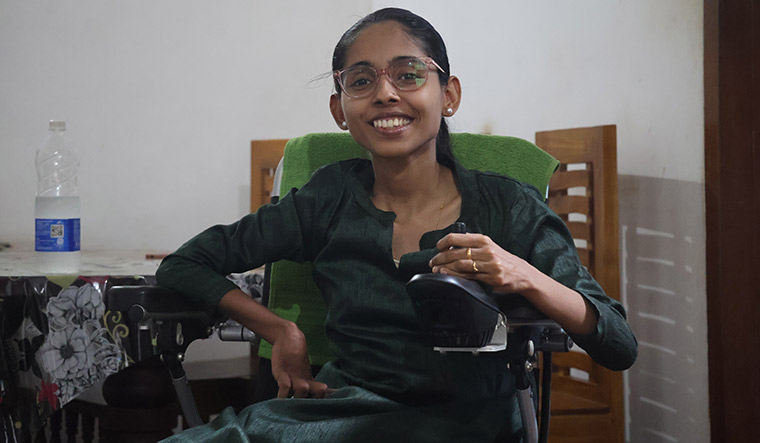There is an innate confidence on Sarika A.K.'s face and a warm smile, too. The 24-year-old from Kerala―who ranked 922 in the UPSC exam―not only went through the rigours of preparing for the tough exam, as lakhs do, but she did so while battling cerebral palsy. “I prefer the IAS, but I am not sure whether I will get it. Whatever service I get into, I will do everything in my capacity for the differently abled community,” she says, sitting on her electric wheelchair.
Cerebral palsy is a group of disorders that affects muscle movement and coordination, with symptoms varying from person to person and ranging from mild to severe. There are four main types. Spastic cerebral palsy―which affects 80 per cent of those with cerebral palsy―is characterised by increased muscle tone, which leads to stiff muscles and awkward movements. Dyskinetic cerebral palsy affects the limbs and involves difficulty in controlling movement, leading to slow or rapid jerky movements. Ataxic cerebral palsy impacts balance and coordination, resulting in unsteady walking and difficulty with precise movements. Mixed cerebral palsy refers to symptoms that are a combination of different types of cerebral palsy.
Diagnosis typically occurs during the first two years of life, with tests to evaluate motor skills and monitor development, growth, muscle tone and more. “In my case, at birth itself, my legs were in a crossed position and doctors performed an immediate surgery,” says Sarika. “Six months later, additional difficulties emerged. I did not achieve the development milestones, prompting my parents to consult a doctor who identified movement and musculoskeletal issues. Further surgeries were recommended. At the age of five, I underwent a hip surgery to address the height discrepancy between my legs. Unfortunately, this procedure was unsuccessful and exacerbated my condition. Since then, I have relied on a wheelchair. Doctors suggested further surgeries, but we were unsure of their success and decided not to pursue it.”
Sarika is the daughter of Sasi, who is a driver in Qatar, and Ragi, a homemaker. She also has a younger sister. Her mother has been Sarika’s biggest support system. “Even now, I require assistance in all my daily routines, and my mother is helping me,” she says. “Throughout these years, she has taken care of me. She has dedicated her life to me.”
While speaking to THE WEEK, Ragi said that her daughter had to endure a lot of pain over the years, including not being able to be like the other kids at school. “A major issue we faced during those growing years was finding a physiotherapist in our locality,” she says. “Now, we have a physiotherapist who visits Sarika thrice weekly at home to ensure that her muscles do not get stiff.”
Accessibility also poses a great challenge for the differently abled, says Sarika. In fact, special arrangements had to be made at the centre for her UPSC mains exam in Thiruvananthapuram.
“During my primary school years, I remained in the same classroom for four years because the school had only one ramp. Although I progressed academically, my classroom remained the same,” she recalls with a smile, noting the invaluable support of her friends and teachers. “She enjoyed going to school; she never preferred sitting idle at home,” says Ragi.
Reading became a habit for Sarika during her upper primary years, and this habit eventually steered her towards the UPSC. “I came across a book, Collector Bro, written by former Kozhikode collector Prashant Nair,” she says. “It served as a great inspiration.”
One of her teachers then sent her information about Project Chitrashalabham (butterfly), a initiative of Absolute IAS Academy that offered scholarships for free civil service coaching for the differently abled. “I applied and was selected for online training,” she says. “I mostly studied during the night, as it was the most suitable time for me. I cannot sit for long hours, so I took breaks. Whenever I had back pain, I would lie in bed for 30 minutes to an hour.”
During her school years and into her late teens, Sarika had a manual wheelchair. Only last year did she get an automatic one, which significantly enhanced her mobility and made her more independent. It also helps that she is not currently on any medication. “However, my physiotherapist helps me with stretching and movement exercises,” she says.
Sarika adds that though she has grown up to see society becoming more inclusive, there is a lot left to be done. “When I was in school, the concept of accessible toilets or classrooms did not exist,” she says. “Transportation posed another significant challenge; public transport was inaccessible for someone like me, so I had to rely on auto-rickshaws, which cost a lot.”
Sarika will now get an official vehicle as a civil servant. But her ultimate dream is to take along as many differently abled people as she can on this journey.


